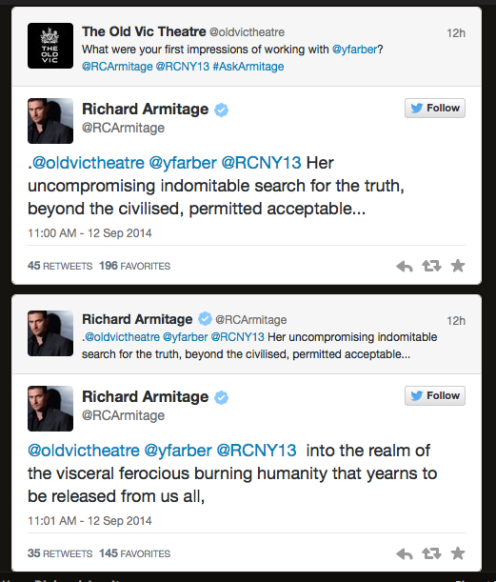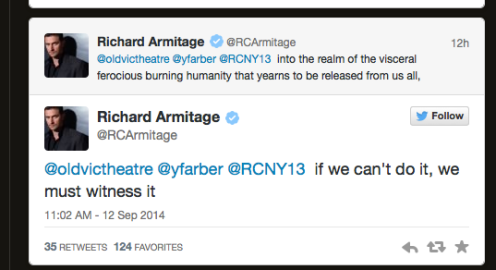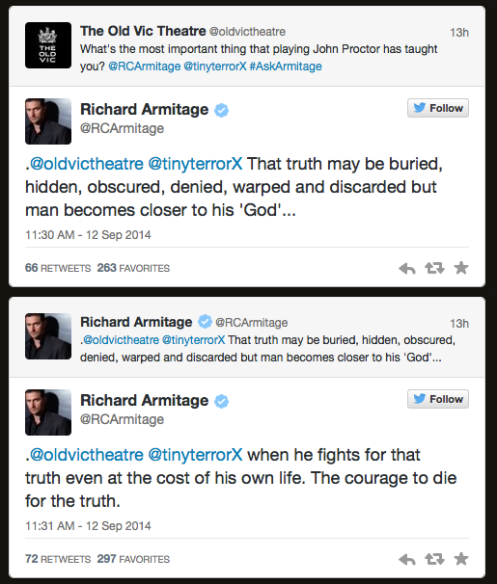In which Richard Armitage’s tweets remind me of things I learned in London
I’m really glad Richard Armitage answered this question. I asked a similar, more vague one — what is the collaboration with Yael Farber like? — but this one is better than mine because it asks for something much more precise. 140 characters, after all. Or less, by the time the handles and any hashtags are added. I think this was supposed to be a hashtag, no? Preparation to become Proctor: “CowsVoiceSalemMillerMillerMiller”. I’m not sure it will catch on. But I wonder what it means. If Richard Armitage has a stream of consciousness voice that speaks inside his head, anytime he lets it go, seriously or for the purposes of humor, I’m curious.
Finding and then taking hold of that stream every day — a real battle for me, anyway. I really didn’t know what would happen when I started on this journey of blogging about Richard Armitage. I felt helpless, and reanimated, and driven to know, to figure it out — and I gradually became able to feel pleasure again, and then was able to write, as I hadn’t in years. The writing was the journey and somehow it gradually turned into the goal as well. It’s one of the things that I desire all the day long — to feel human, to be more fully human, to act in concern with that humanity, to be humane. I want to write about what’s true (even when I do so in a veiled way, or rather, when the truth appears to me in its veiled guises), and that includes finding words precisely for the things that are hidden because they don’t fall into the categories of permitted, acceptable, civilized. The search first for what is real and then for the words to talk about it to other people — a liberation for myself, and I hope, for some of the people who read it.
No one does this perfectly, me least of all. But in the wake of all the inspiration I was exposed to in London, I was wondering what would change for me. Because I felt changed. I remember waking up on Thursday morning and seeing that someone had tried to start a fight somewhere about one of the usual things and thinking: trivialities. Not part of the big picture, so why do I even care about this? But there’s a weird paradox to knowing what the big picture is — you have to look at a fair amount of detail to discern it; just as there’s a weird paradox to being a fan — it gives you a kind of joy free that’s deeply unfettered, deeply human, moving beyond the feelings of the civilized to connect you with something broader; but the potential extremes of the experience end up exposing you to all this discourse about marking the most appropriate, acceptable boundaries of the civilized. We are all growing all the time, if we want to, but it’s not a linear, direct process.
So this is a nice message, a great reminder after seeing that play. Search for truth. Search for what’s real beyond the permitted. In what you do, release the burning humanity — in all of its facets, good, evil, desirable, distasteful, beautiful, sublime, quotidian. Or at least witness it — it is your obligation.
Theater is a sort of playground for that kind of information as writing is, no? It’s rather silly to say that actors are playing or not doing real or important work, or to make the point that theater is not real, or that real life is sadder than theater. It’s another way of prioritizing the values of civilization over the uncivilized. The first claim will appear to silly to anyone who’s ever seen a truly great play, the second is obvious, and the third is only sometimes the case. Rather the point of theater on this view is that it be sufficiently (however-we-define-that-term) realistic that it allow us to experience that search for the true, real, the burning, the humane, on an unreal level that then gives us courage to live out the search for truth and humanity and face what we find in our own, real lives and worlds. As another group of tweets said,
Truth, humanity, uncivilization, the move beyond what is allowed — that’s what I am looking for now. We’ll see how it goes.
***







Do you think he knew what the questions were in advance and prepared answers or did he answer them spontaneously?
LikeLike
My opinion is that he answered spontaneously. He has lived and breathed this play and prepared so thoroughly with Ms Faber that he absolutely knew what he wanted to communicate, and did so so eloquently. This same level of … I don’t have the words to say …. was displayed during both the Hobbit press tours, especially when he had an interviewer that asked any worthwhile questions.
LikeLike
Hi Heather. Can it be a little bit of both? A touch of preparation with spontaneity mixed in?
LikeLike
I would say a bit of both, because he is always super prepared; it seems to be his nature.
LikeLike
Just my impression. I recall the interviewer said the questions were “randomly preselected by both of them”. I think he had a look at the questions beforehand. I was there and in a daze, but he did not hesitate or need time to formulate answers to questions. I don’t think he prepared answers ahead of time, as in memorizing or writing them down, but I think he gave them some thought. His responses were very natural and relaxed. Considering that he had to give a performance after the event, I would hope he did have a little prep time to think about his answers so the “conversation” would not be stressful or full of surprises for him.
LikeLike
Just FYI, I think we’re talking about two different things, Kathy. These were tweets from yesterday.
LikeLike
Oh, thanks for the clarification. I am sorry about that. I did read the tweets. Is there a way for tweets to be anything but spontaneous? Would you have to have “friends” tweet ahead of time or filter them somehow? Just asking. I have no idea.
LikeLike
Yes, absolutely, there are ways for them to be non-spontaneous. Tweets can even be scheduled, although I’m thinking that didn’t happen here. In any case, they absolutely had to be filtered because they asked for questions with the hashtag on 9/2 and they did this yesterday — I didn’t track when the questions were asked that they chose, but they didn’t tweet him all the questions.
LikeLike
Thank you for the explanation. Is there a book “Tweeting for Dummies?” I can buy? I need it. 🙂
LikeLike
There might be …. I usually find that just playing with these things is enough for me, though 🙂
LikeLike
You are far more accomplished than I. 🙂
LikeLike
I assume he knew ahead of time, though that doesn’t make a difference to my opinion of what he said. He’s never been that great an off the cuff answerer, IMO, and one thing this medium really does for him, I think, over against interviews (whether he knows the question ahead of time or not) is cut out the “um” and the elliptical answer thing. I have no problem with his elliptical answers a la Sept 2, they are interesting — but this is short, direct, and energetic. Really impressed with how he’s using Twitter and assume it’s because he’s had some advice and practice.
LikeLike
I agree with your “um” observation. The Twitter format seems to be enabling him to give “short, direct and energetic” answers. I am impressed as well, and I wish I had his Twitter teacher (if he has one) give me some lessons.
LikeLike
I guess I don’t see what the question of whether he prepared or wrote these off the cuff has to do with the actual issue I was addressing here, which was the question of art in relationship to the search for humanity and the way that performing this play facilitated that for him and us.
LikeLike
You are right – it’s completely irrelevant !
LikeLike
I want to attempt to answer the question of “prepared vs. off the cuff” answers and how they relate to the issue of “art in relationship to search for humanity …” The only way we can know how performing the play facilitated that for him is by observing his subsequent life and work (a long-term project which we all might like to take on), or by asking him. Anytime we ask him, or anyone, a question, we hope for an honest, straightforward answer. In general, questions asked and answered “off the cuff” are perceived as more honest or genuine because the answerer hasn’t had time to craft their response. For many people, getting the question in advance is “cheating”. It allows the responder to appear wise, insightful, witty, whatever, without having to pause and organize their thoughts. In the search for truth, it is relevant to know if the person is answering spontaneously or not. It makes a difference. We can all appear brilliant if given enough time to answer. But in the issue of art, humanity, performing or observing the play, that you were addressing, IMO, spontaneity doesn’t make a difference. It is a complex issue that requires a lot of time to process (for him and for us) and cannot be answered adequately “off the cuff”. So in this case, the question of whether he prepared his answers or not is irrelevant regarding the art and humanity topic you raised.
LikeLike
I guess, and I’m going to be blunt because I’m tired, if the tweets reflect what he intended to say in either case it doesn’t matter to me. I don’t think we as fan observers are ever in a position to discern the absolute distinction between realism and reality, though. I can’t think why he’d say something he didn’t stand behind in a situation like this. The only problem for me would be if it turned out he hadn’t been composing the answers himself, but these are consistent enough with his other personae around this play that I think we can reasonably discard that possibility.
re: we can all appear brilliant if given enough time to answer: I don’t think so. But I may be jaded by spending decades in college classrooms.
LikeLike
You got me there. 🙂 I only spent four years in them. Plus a little fine tuning, once in a while. When I referred to “appearing brilliant” I was thinking about all the times in life we find the perfect comeback to someone, hours after the opportunity has passed. Or myself, who always performs brilliantly when given time to think. Kidding. My not so “brilliant” comment doesn’t really apply in this case (upon further reflection). And I don’t think for a minute he has someone else write his answers. I agree he is consistent in his personae around the play.
LikeLike
I think you’re brilliant.
LikeLike
This. With glitter.
LikeLike
Thanks.
LikeLike
Beautiful song..so consoling. Thank you! . My fav. is Right Down The Line .
I didn’t uderstand a word then..but I remember thinking – it must be about something beautiful 🙂
LikeLike
need to remind myself of these things at times.
LikeLike
[…] go to bed on Wednesday night stewing in a weird combination of exhilaration, bemused wonder at the things that have occupied me recently that now seem so trivial, and grief — because I realize I can only see this four more […]
LikeLike
Richard Armitage crash: Thursday, August 28th | Me + Richard Armitage said this on September 15, 2014 at 8:47 am |